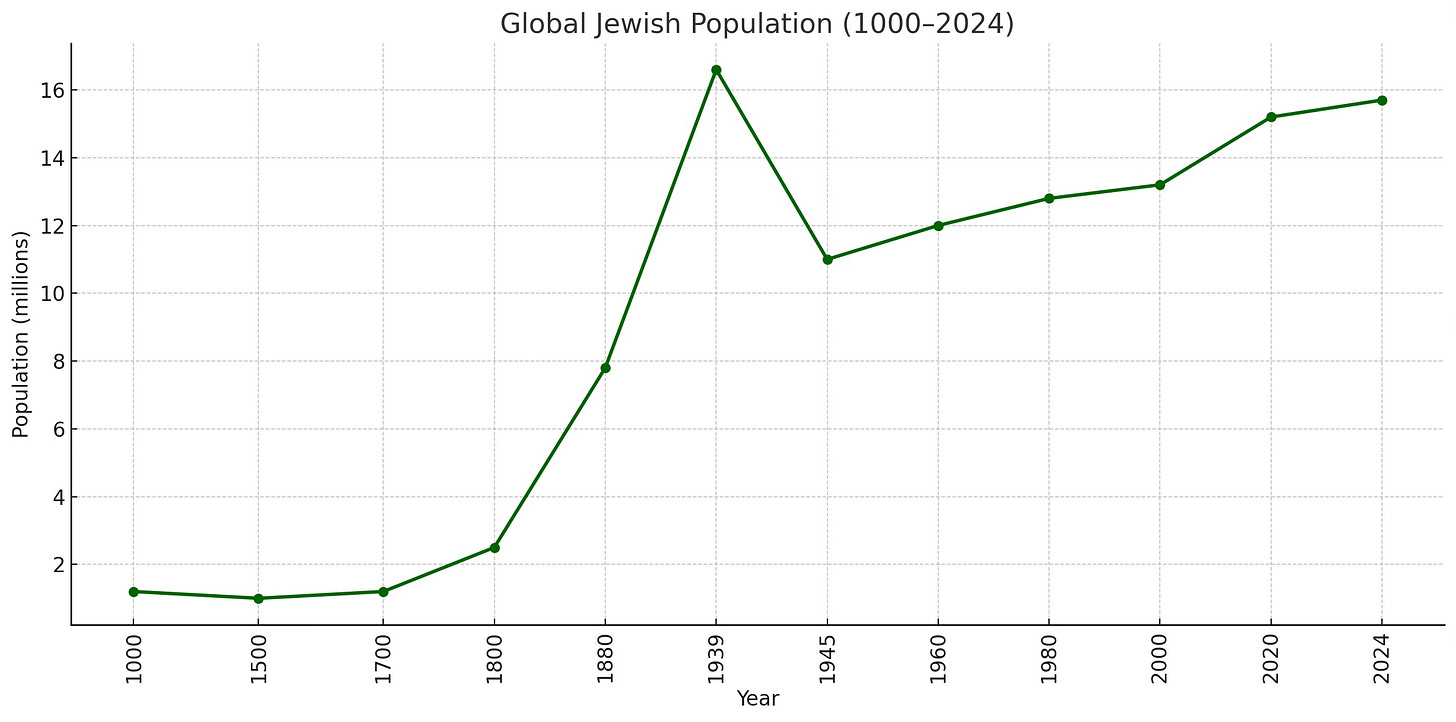וּרְאִיתֶ֥ם אֶת־הָאָ֖רֶץ מַה־הִ֑וא וְאֶת־הָעָם֙ הַיֹּשֵׁ֣ב עָלֶ֔יהָ הֶחָזָ֥ק הוּא֙ הֲרָפֶ֔ה הַמְעַ֥ט ה֖וּא אִם־רָֽב׃
and see what kind of country it is. Are the people who dwell in it strong or weak, few or many?
Gimme Some Torah #733
Many thanks to Rabbi L. for becoming a paid subscriber!!
Moses tells the spies to reconnoiter the land in order to determine its geography and ethnography. Here is Rashi’s comment regarding the latter issue:
אֶת־הָאָרֶץ מַה־הִוא — WHAT KIND OF COUNTRY IT IS: There are countries which rear strong people and there are countries which rear weak people; there are such as produce a large population and there are such as produce a small population (Midrash Tanhuma, Shelah 6).
There really are factors that lead to more population growth in some countries and less in others. Take, for instance, India. In 1951, the year that England granted India its independence, the Indian population was 361 million. The current count is 1.45 billion, a tripling in just 73 years. Why is India the most populous nation on the planet?
I cannot provide a complete answer to that question, but the reasons include widespread poverty that has encouraged family growth and advances in modern medicine that have lengthened lifespans.
Now let’s look at the House of Israel, the Jewish people. There were as many as 7 million Jews in the Roman Empire. The fall of the Empire and plagues led to a general drop in world population, so there were only 1 million Jews worldwide in the year 1000 CE. (Forced conversions and mass murders no doubt played a role, too.)
Advances in technology led to a dramatic increase in world population in the 19th century, and the Jewish census rose commensurately. But while the rest of the world has enjoyed (?) ever increasing demographic growth, the Jewish population increase since the Holocaust, when 1/3 of all Jews were murdered, has been anemic. What gives?
Again, it’s not a question that has a quick answer. But here’s what I think: Judaism has not sought out converts since the days of the Roman Empire. Back then, millions of Romans who had grown disillusioned with their pantheon converted to Judaism; some of them became famous Jewish sages.
After the destruction of the Temple and the wars that led to our expulsion from the Land of Israel in 135 CE, conversion to Judaism and proselytizing were outlawed. This state of affairs survived the Empire and became part of Church canon and European culture.
By the time conversion to Judaism became legal again, our culture had long since turned against the idea of inviting outsiders to join us. Converts were (and sometimes are) looked at with a mix of love and suspicion. The Shulhan Arukh, a code of Jewish law, essentially directs rabbis to ask potential converts, “Why on earth would you want to tie your destiny to the most hated and miserable tribe on Earth?” We don’t exactly have a winning message when it comes to converts!
Should we change and start welcoming converts? Maybe. We should definitely do everything we can to encourage the native growth of our people, as well. As things stand today, the future of the Jewish people is deeply Orthodox. Their birthrates and dedication to community building are so strong that their numbers both in America and Israel grow younger and larger every year. And just to be clear, that’s a good thing!
If, however, we more liberal Jews want our blend of religion and modernity to continue, we’re going to have to make it appealing to far more people. Achieving that goal will require us to engage in active and energetic community building.
I have a feeling that it will also require more tradition rather than less.
•••
Thank you so much for reading Gimme Some Torah! If you can afford to purchase a paid subscription, please do—paid subscribers get access to the entire GST library!
I am the rabbi of Temple Beth El in Somerset, New Jersey, and the author of The JPS Jewish Heritage Torah Commentary.




I made tshuv’ah—having been raised ‘culturally Christian’ by a Jewish mother and a non-Jewish father—because of the beauty of (at least) traditional Conservative liturgy! I wanted more authenticity in my spiritual life—the same goes for many folks my age, Jewish or otherwise.